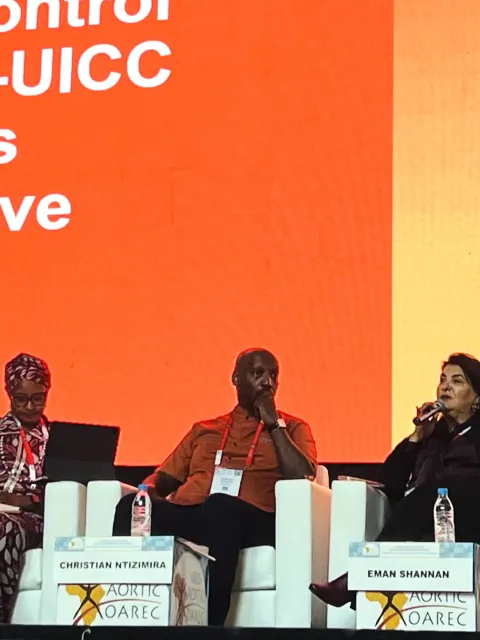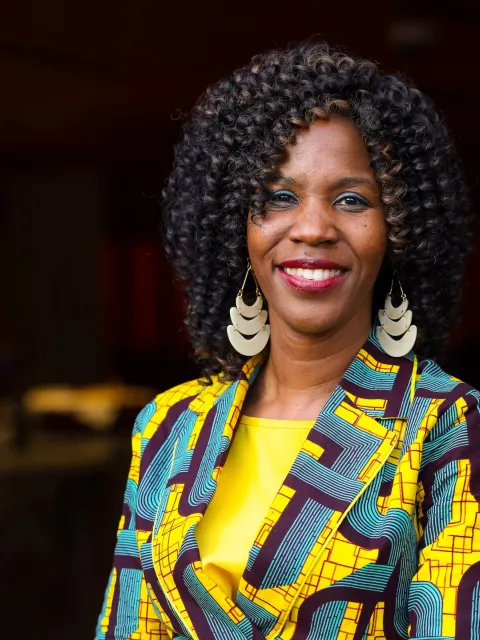Cancer control in Africa: paving the way to Universal Health Coverage
Where you live still determines your chances of surviving cancer. There are striking differences in the mortality rates and in the prevalence of certain cancer types across the world.

According to the latest Cancer Atlas, this global diversity reflects both the presence of local risk factors for specific cancers and the extent to which effective cancer control measures have been implemented.
While cervical cancer remains a rare cause of death among women in Europe and North America, 90% of cervical cancer deaths globally per year occur in low- and middle-income countries, with the highest-burden (over one-third of all cervical cancer deaths) borne by sub-Saharan African countries.
Such stark inequalities in outcomes for preventable and treatable cancers are unjust and immoral, contradicting the right to health as enshrined in international human rights law.
The Cancer Atlas which was recently launched by UICC, IARC and ACS points out that much of the observed variation can be ascribed to lifestyle and environmental factors and underlines the critical role of cancer prevention as a means to reduce the future cancer burden. Prevention measures include eliminating exposure to lifestyle and environmental risk factors, including tobacco and alcohol, dietary factors, excess body weight, UV radiation, and increasing resistance to infection by vaccination.
Several African countries have made strides in addressing the prevention of non-communicable diseases (NCDs) like cancer. This is evidenced by the Brazzaville Declaration on NCD Prevention and Control in the WHO African Region adopted in 2011, which member countries signed to affirm their political willingness to put in place strategies and resources to control NCDs.
Today, two-thirds of African countries have national cancer control plans (NCCPs) compared to only 46% in 2013 which help them identify, prioritise and implement the most effective actions.
Yet, there is still work to be done with regard to prevention measures and the implementation of strong healthcare systems which are able to effectively deal with non-communicable diseases.
‘It is evident that increased cancer awareness in Africa is resulting in notable success stories like the universal coverage of breast and cervical cancer services that we recently recorded in Senegal. However, limited access to quality and affordable cancer services, poor surveillance and research structures and unresponsive health policies to NCDs remains a challenge that continues to demand a global coalition of actors to improve outcomes in Africa. ’
– Zainab Shinkafi-Bagudu, Founder, Medicaid Cancer Foundation, Nigeria
To help address the cancer challenges across the region, the Union for International Cancer Control (UICC) is attending the AORTIC’s 12th International Conference of Cancer in Africa taking place in Maputo, Mozambique this week.
As part of the opening ceremony, UICC’s President, HRH Princess Dina Mired, launched the publication: “Cancer control in Africa: paving the way to Universal Health Coverage” developed by UICC, the African Organisation for Research and Training (AORTIC) and the International Cancer Control Partnership (ICCP).
UICC President, Princess Dina Mired attending the opening ceremony of the AORTICs 12th International Conference of Cancer in Africa.
This is the first publication on cancer control and Universal Health Coverage (UHC) in Africa. It has been developed to reflect an advocacy and policy perspective on the status of national cancer control planning efforts in the African region with a view to including cancer in UHC plans across the continent. The focus of each chapter is to place a ‘spotlight’ on the current status of a specific aspect of cancer control, challenges and gaps in each area as well as policy recommendations for improvement to achieve the ‘Health for All’ vision of Universal Health Coverage.
UICC's President, Princess Dina Mired, launches the first publication on cancer control and Universal Health Coverage (UHC) in Africa at the opening ceremony of AORTIC.
Jointly with the African Cancer Registry Network (AFCRN) and International Agency on Research on Cancer (IARC), UICC also released volume III of Cancer in Sub-Saharan Africa. The publication presents statistics on cancer incidence from 31 cancer registries in 22 countries across Africa, eight of which are new, and did not appear in Volume II. These publications demonstrate the power of international collaboration around the same goal and hopefully will serve as an inspiration for the young African generation to move the regional agenda of cancer control forward on the continent.
Last update
Monday 15 January 2024
